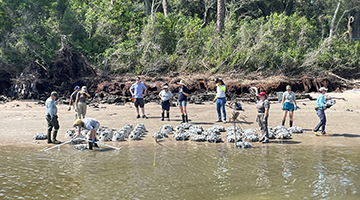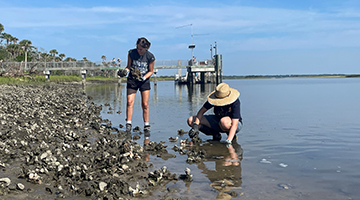UNF & partners host largest POSH shoreline restoration project
 Members of the University of North Florida shoreline restoration research team, National Park Service, Timucuan Parks Foundation and St. Johns River Water Management District (SJRWMD) today deployed the largest pervious oyster shell habitat (POSH) shoreline restoration project in the area to date.
Members of the University of North Florida shoreline restoration research team, National Park Service, Timucuan Parks Foundation and St. Johns River Water Management District (SJRWMD) today deployed the largest pervious oyster shell habitat (POSH) shoreline restoration project in the area to date.
The team of researchers and volunteers installed nearly 150 POSH structures. This community project assists in restoring oyster reefs, fighting erosion, rebuilding fish populations, saving the marshes and reducing loss of historic coastal communities and artifacts. This project was made possible in part by support from the National Park Foundation and Stericycle.
 UNF is leading coastal resiliency research and restoration with interdisciplinary efforts. The POSH structures are invented, designed and produced by UNF faculty and researchers led by associate professors, Dr. Kelly Smith, biology, and Dr. Raf Crowley, civil engineering, working with Dr. Jim Gelsleichter, Shark Research Program director. Aerial recordings of the effectiveness of the habitats and recording shoreline change over time is being conducted by Dr. Chris Baynard, GIS associate professor, and Robert Richardson, ITS assistant director of research technology & services.
UNF is leading coastal resiliency research and restoration with interdisciplinary efforts. The POSH structures are invented, designed and produced by UNF faculty and researchers led by associate professors, Dr. Kelly Smith, biology, and Dr. Raf Crowley, civil engineering, working with Dr. Jim Gelsleichter, Shark Research Program director. Aerial recordings of the effectiveness of the habitats and recording shoreline change over time is being conducted by Dr. Chris Baynard, GIS associate professor, and Robert Richardson, ITS assistant director of research technology & services.
The results of the POSH unit installations over the past few years in various local locations including the Kingsley Plantation and Wright’s Landing at Guana Tolomato Matanzas National Estuarine Research Reserve (GTMNERR) were recently published in the open-access journal Sustainability. The research shows that the UNF modules are more effective than the industry standard, ReefBalls, at recruiting live oysters. Graduate student research assistant Hunter Mathews is the lead author of the study. UNF engineering and biology graduate students participated in these projects and helped guide construction of many of the POSH installations with Green Team youth volunteers with Groundworks Jacksonville and Timucuan Parks Foundation volunteers.
This project provides a promising option for oyster reef restoration in energetic estuarine systems, creating an environmentally friendly and effective solution for enhancing oyster habitat and shoreline stabilization that the entire community is coming together to work on and will benefit from.
